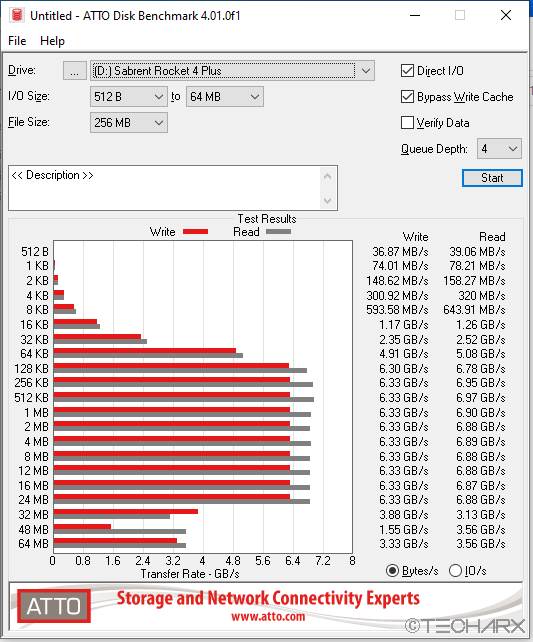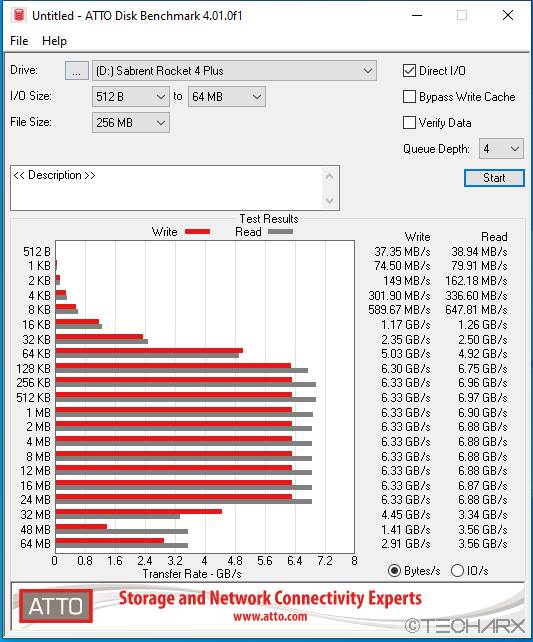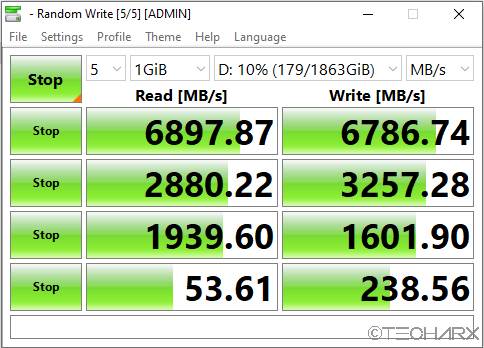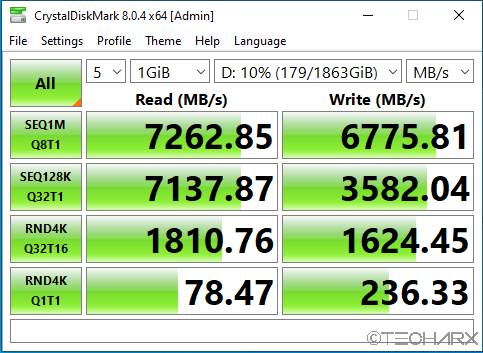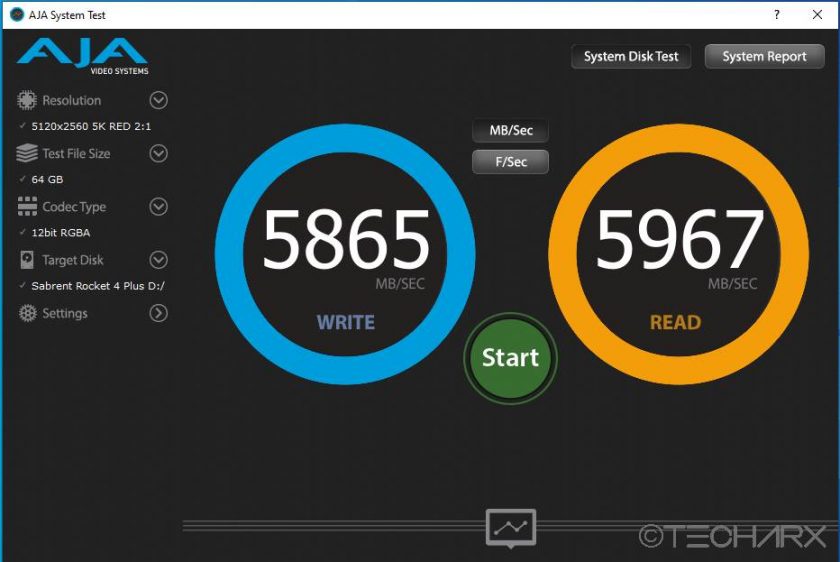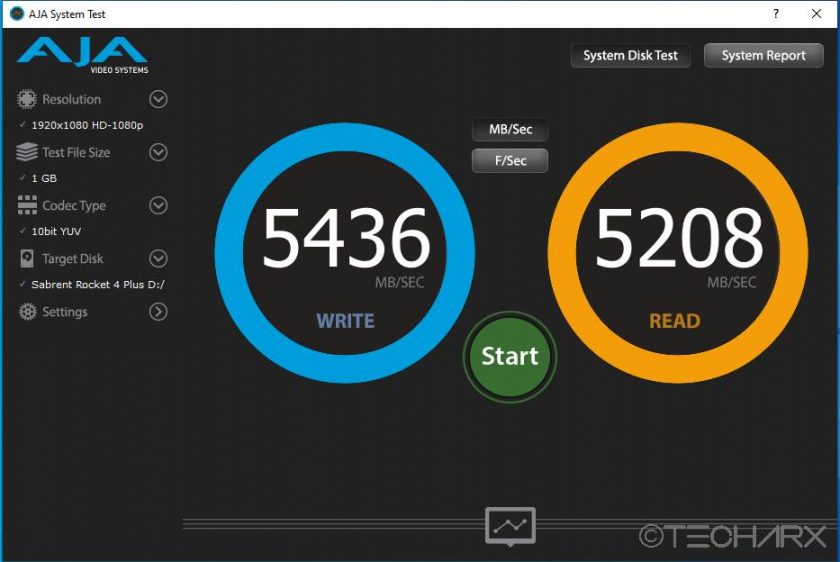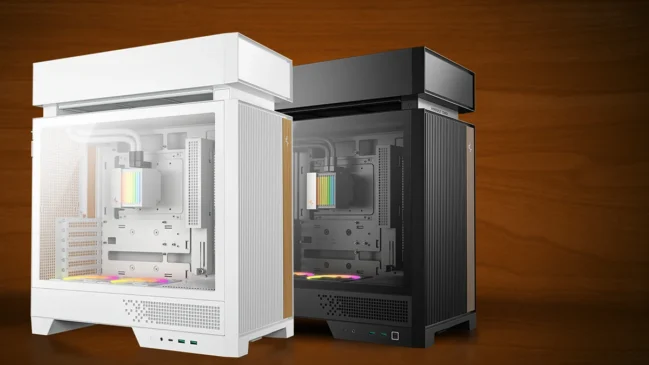
Sabrent is a relatively new name in the market. In a short span of time, they have managed to bring affordable and workload focussed flash storage to the masses. The SSD we have with us today is the Rocket 4 Plus which is an upgrade/ next of kin? of the Rocket 4 Gen 4 SSD we reviewed earlier. As always, a big thanks to Sabrent USA for kindly supplying us with a sample.
Specifications
The Rocket 4 Plus is Sabrents offering with the Phison EPS5018-E18 NVMe SSD controller. We have already tested the KC3000 and the FURY Renegade from Kingston with the E18, it will be interesting to see what Sabrent has done with it. Sabrent advertises the specifications of the drive very conservatively; Sequential performance clocks in at up to 7.1/6.6 GBps read/write, and the SSD can deliver upwards of 650,000/700,000 random read/write IOPS. Like the Rocket NVMe 4.0, the Rocket 4 Plus comes with a large dynamic SLC cache that spans one-third of the device’s capacity. The drive uses two Hynix DDR4 DRAM ICs that operate at 1,600 MHz, with the 2TB model sporting two of them for write caching. The drive comes in the standard m.2 2280 form.
| Product | Rocket 4 Plus 1TB | Rocket 4 Plus 2TB | Rocket 4 Plus 4TB |
|---|---|---|---|
| Pricing | $199.99 | $399.99 | $799.99 |
| Capacity (User / Raw) | 1000GB / 1024GB | 2000GB / 2048GB | 4000GB / 4096GB |
| Form Factor | M.2 2280 | M.2 2280 | M.2 2280 |
| Interface / Protocol | PCIe 4.0 x4 / NVMe 1.4 | PCIe 4.0 x4 / NVMe 1.4 | PCIe 4.0 x4 / NVMe 1.4 |
| Controller | Phison PS5018-E18 | Phison PS5018-E18 | Phison PS5018-E18 |
| DRAM | DDR4 | DDR4 | DDR4 |
| Memory | Micron 96L TLC | Micron 96L TLC | Micron 96L TLC |
| Sequential Read | 7,000 MBps | 7,100 MBps | 7,100 MBps |
| Sequential Write | 5,300 MBps | 6,600 MBps | 6,600 MBps |
| Random Read | 350,000 IOPS | 650,000 IOPS | 650,000 IOPS |
Test Setup
We requested the folks from Tuktak Tech community to handle the testing along with us as a collabo and they graciously accepted. The test rigs are from them and the effort is joint and the result was fun! Go check them out on Youtube, you will not be disappointed!
| Processor | Ryzen 9 3900X |
|---|---|
| Motherboard | MSI MPG B550 Gaming Plus |
| Memory | 4x16GB 3600 MHz (16-19-19-39) Trident Z Neo (Dual Rank SK Hynix) |
| Graphics Card | Colorful iGame Geforce RTX 3060 TI Ultra OC |
| Storage | Sabrent Rocket 4 Plus 2TB |
| Power Supply | Deepcool DQ850M-V2-L |
With the setup ready to go..we ran the Fury Renegade through our usual gauntlet.
Atto Disk Benchmark
The great thing about ATTO is that one can test with predefined block sizes. So, we can test with a 32MB sequence of 4KB files, yet also 32MB in 1MB files, providing an opportunity to test with various file sizes. This benchmark is preferred among manufacturers as ATTO uses RAW or compressible data and, for our benchmarks, we used a set length of 256mb and tested both the Read and Write performances for various transfer sizes ranging from 0.5 to 8192kb with a user-selected queue depths.
With ATTO we hit the advertised speed pretty much to the T. A bump in speed is seen after the file size crosses 24MB, this is because the write cache gets all filled up and the drive starts offloading the data into flash. Unless one is writing humongous files 24/7, this will not be a point of concern.
CRYSTAL DISK Benchmark
Crystal Disk Benchmark is used to measure read and Write performances through the sampling of highly compressible data (oFill/1Fill), or random data. Crystal Disk Mark scores usually drop a bit compared to ATTO, and this is the result of the test data now being primarily incompressible – Mostly movies, music, and photographs. We tested the drive with a 1 GiB Sample with and without the heatsink that came with the motherboard.
Anvil’s Storage utilities Benchmark
Anvil Pro or Anvil’s Storage Utilities[Depending on what you’d want to call it] is an ‘all-inclusive’ storage utility that allows testing transfer speeds as well as IOPS and lets the user tweak and adjust to find just the right mix in their testing medium, the IOPS tests being fully configurable with preset testing scenarios for read, write and mixed IO. The Benchmarks menu includes an SSD test, Endurance Testing, and 3 pre-configured IOPS tests.
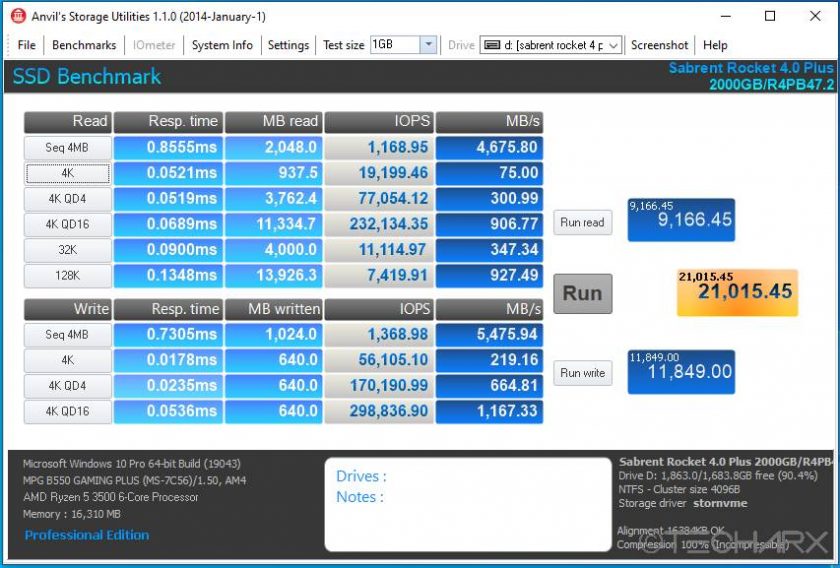
AJA System Test
AJA system test is used to benchmark the performance of a drive for video production workflow across various codecs with different settings.
AS SSD benchmark Suite
Last but not least is AS SSD Benchmark. This nice little German application gives an extensive result set. The test is popular, so I included it. AS SSD, for the most part, gives us the worst-case scenario in SSD transfer speeds because of its use of incompressible data.
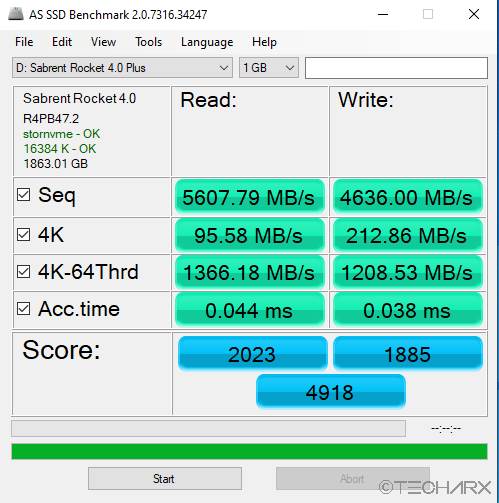
Conclusion
Our overall impression of the Rocket 4 Plus is positive. The drive is a very capable contender for a daily driver in normal gaming and streaming workloads. The massive write speed performance it brings to the table is something to be reckoned with; provided you cool it down appropriately. The sequential Sequential performance is a strong suit of the Sabrent Rocket 4 Plus, and in that regard, it is one of the fastest drives we have tested so far. As long as the cache is not filled to the brim, the drive will offer blazing fast performance, after that it will not be a slouch but the difference can be perceived. Most gamers and prosumers will not feel this to be an issue.
The warranty seems to be a bit of an issue, we are not a fan of registering our products to get full 5 years warranty. Without registration, this comes with one year out of the box, am pretty sure this concern will be addressed somehow by Sabrent. All things considered, this is a good SSD with a very compelling price point. A product worthy of your consideration if you are looking for a decent good looking Gen 4 SSD without burning a moon size hole in your wallet or pocket.
A silver from TechARX this time.


